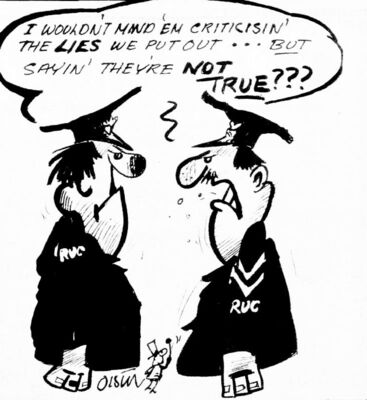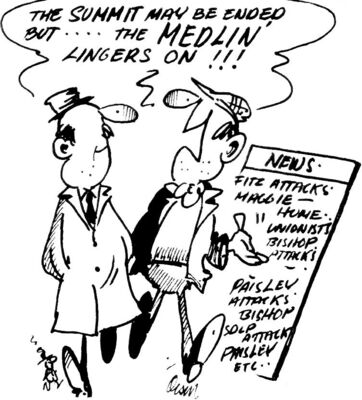We look back at the stories that were making the headlines this week in 1983
Anger as wife of the SoS visits St Louise’s
SEVERAL upset parents have contacted the Andersonstown News to express their concern and sadness at a top-secret visit this week from Mrs. James Prior to St. Louise's Comprehensive College on the invitation of Sister Genevieve.
The callers were united in their regret that St. Louise's, which has won the admiration of educationalists throughout Europe, should be the venue for the first appearance of the wife of a British Secretary of State at a West Belfast school.
Accompanied by two armed and plainclothes R.U.C. officers, Mrs. Prior arrived at the school on Tuesday and met with a number of hand-picked pupils. The parents of the pupils were not informed that the top ranking British V.I.P. would be coming to the school.
While teachers were simply told the previous evening that "things should be put in order as a visitor" was expected.
Sister Genevieve, principal at the much-acclaimed school, was not available for comment yesterday. Repeated telephone calls to her office were met with the claim that she was “at lunch”.
One dejected parent told the Andersonstown News: "Things are in a sad state when this woman who is involved in publicity work for a government responsible for the murder by plastic bullets of seven innocent school children, should be invited to a Falls Road school.
"Surely parents have the right to know what type of person is going to be introduced to their children."
Sinn Fein's representative in West Belfast, Gerry Adams, has slated the media for imposing a new ban on the visit.
"We released a telex about the incident on Tuesday afternoon but the media absolutely refused to cover the story."
Twinbrook benefits
IN a press statement the Twinbrook Tenants’ Association have condemned the proposed rises in rent and electricity and announced moves to help those hardest hit by the increases.
"Next month's increase in rents by the N.I.H.E. and the corresponding 13 per cent increase in heating charges for those tenants unfortunate enough to be linked to District Heating Schemes operated by the N.I.H.E., means yet another major hardship for those people who have already been forced to carry the burden of the present depression by the Thatcher administration.
Since 1978 rents have risen by 150 per cent and with more rises imminent under the 1981 Housing (NI) Order, in the years to come, is it any wonder that tenants’ debts have risen from £9 million to £22 million. It’s not only rent and heating charges that have risen – in the last five years, electricity charges have risen by 110 per cent and as a result an average of eight households a day were disconnected by the NIES between 1981 and 1982.
In the Twinbrook area the Tenants’ Association believes that up to 16 per cent of the households are not claiming rent rebates they are entitled to. The statement goes on to say that about 68 per cent of households are claiming benefits like supplementary benefits, etc., and could be entitled to a lot more – especially regarding 'single payments'.
Editorial: Trócaire’s work is inspiring to us all
IT is our Christian duty to demand that the political authorities representing us act always with justice and with responsibility towards less fortunate countries and be prepared to use all means necessary for this end.
This is how the Irish Catholic bishops viewed Third World Development in 1973, and it could be said to be the battle cry of the Trócaire organisation which is this year celebrating its tenth anniversary.
Trócaire has been over the past ten years, a shining example of Ireland's traditional missionary spirit of help, compassion and understanding for the less fortunate. It has tried valiantly on a very limited budget to come to the aid of millions of people in Third World countries, who are being deprived of the very basic necessities of life.
The organisation quickly learned that material help alone was not successful to alleviate the massive problems in these countries, and that help to correct a corrupt political or social system was every bit as important as a loaf of bread or a sack of flour to deprived people. This recognition has led to the organisation coming into conflict with governments and regimes in many countries of the world. This is how it should be, and is a welcome change from the non-intervention and non-political roles of many other purely relief organisations.
Trócaire recognises that there are unjust structures in the world which govern trade and commodities, such as tea, coffee, sugar, fruit production. These structures are loaded against the under-developed countries and are working against the best interests of the people in these countries. The market for these products and many more is in the rich world and so the rich world dictates the price paid and thereby maintains millions of people in poverty. There can be no meaningful change for the better in the Third World until these unjust structures are changed. This is what differentiates between a group seeking justice for all and a relief organisation and long may it be so.
We wish all the people involved in Trócaire a happy tenth birthday.








